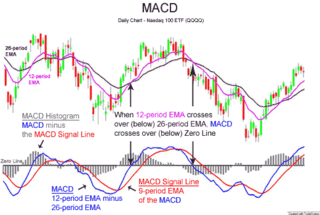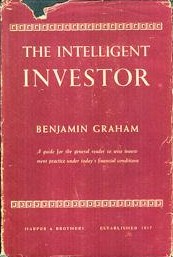
A stock market, equity market, or share market is the aggregation of buyers and sellers of stocks, which represent ownership claims on businesses; these may include securities listed on a public stock exchange, as well as stock that is only traded privately, such as shares of private companies which are sold to investors through equity crowdfunding platforms. Investment is usually made with an investment strategy in mind.

In finance, being short in an asset means investing in such a way that the investor will profit if the value of the asset falls. This is the opposite of a more conventional "long" position, where the investor will profit if the value of the asset rises.
A mutual fund is a professionally managed investment fund that pools money from many investors to purchase securities. The term is typically used in the United States, Canada, and India, while similar structures across the globe include the SICAV in Europe and open-ended investment company (OEIC) in the UK.

Day trading is a form of speculation in securities in which a trader buys and sells a financial instrument within the same trading day, so that all positions are closed before the market closes for the trading day to avoid unmanageable risks and negative price gaps between one day's close and the next day's price at the open. Traders who trade in this capacity are generally classified as speculators. Day trading contrasts with the long-term trades underlying buy-and-hold and value investing strategies. Day trading may require fast trade execution, sometimes as fast as milli-seconds in scalping, therefore a direct-access day trading software is often needed.

A hedge is an investment position intended to offset potential losses or gains that may be incurred by a companion investment. A hedge can be constructed from many types of financial instruments, including stocks, exchange-traded funds, insurance, forward contracts, swaps, options, gambles, many types of over-the-counter and derivative products, and futures contracts.
In financial markets, stock valuation is the method of calculating theoretical values of companies and their stocks. The main use of these methods is to predict future market prices, or more generally, potential market prices, and thus to profit from price movement – stocks that are judged undervalued are bought, while stocks that are judged overvalued are sold, in the expectation that undervalued stocks will overall rise in value, while overvalued stocks will generally decrease in value.
Program trading is a type of trading in securities, usually consisting of baskets of fifteen stocks or more that are executed by a computer program simultaneously based on predetermined conditions. Program trading is often used by hedge funds and other institutional investors pursuing index arbitrage or other arbitrage strategies. There are essentially two reasons to use program trading, either because of the desire to trade many stocks simultaneously, or alternatively to arbitrage temporary price discrepancies between related financial instruments, such as between an index and its constituent parts.
Contrarian Investing is an investment strategy that is characterized by purchasing and selling in contrast to the prevailing sentiment of the time.

MACD, short for moving average convergence/divergence, is a trading indicator used in technical analysis of stock prices, created by Gerald Appel in the late 1970s. It is designed to reveal changes in the strength, direction, momentum, and duration of a trend in a stock's price.
Market timing is the strategy of making buying or selling decisions of financial assets by attempting to predict future market price movements. The prediction may be based on an outlook of market or economic conditions resulting from technical or fundamental analysis. This is an investment strategy based on the outlook for an aggregate market rather than for a particular financial asset.
In finance, an investment strategy is a set of rules, behaviors or procedures, designed to guide an investor's selection of an investment portfolio. Individuals have different profit objectives, and their individual skills make different tactics and strategies appropriate. Some choices involve a tradeoff between and return. Most investors fall somewhere in between, accepting some risk for the expectation of higher returns. Investors frequently pick investments to hedge themselves against inflation. During periods of high inflation investments such as shares tend to perform less well in real terms.

The Intelligent Investor by Benjamin Graham, first published in 1949, is a widely acclaimed book on value investing. The book provides strategies on how to successfully use value investing in the stock market. Historically, the book has been one of the most popular books on investing and Graham’s legacy remains.

A stock trader or equity trader or share trader, also called a stock investor, is a person or company involved in trading equity securities and attempting to profit from the purchase and sale of those securities. Stock traders may be an investor, agent, hedger, arbitrageur, speculator, or stockbroker. Such equity trading in large publicly traded companies may be through a stock exchange. Stock shares in smaller public companies may be bought and sold in over-the-counter (OTC) markets or in some instances in equity crowdfunding platforms.
Magic formula investing is an investment technique outlined by Joel Greenblatt that uses the principles of value investing.
In finance, a trading strategy is a fixed plan that is designed to achieve a profitable return by going long or short in markets. The main reasons that a properly researched trading strategy helps are its verifiability, quantifiability, consistency, and objectivity.
CAN SLIM refers to the acronym developed by the American stock research and education company Investor's Business Daily (IBD). IBD claims CANSLIM represents the seven characteristics that top-performing stocks often share before making their biggest price gains. It was developed in the 1950s by Investor's Business Daily founder William O'Neil. The method was named the top-performing investment strategy from 1998-2009 by the American Association of Individual Investors. In 2015, an exchange-traded fund (ETF) was launched focusing on the companies listed on the IBD 50, a computer generated list published by Investors Business Daily that highlights stocks based on the CAN SLIM investment criteria.
Seeking Alpha is a crowd-sourced content service for financial markets. Articles and research covers a broad range of stocks, asset classes, exchange-traded funds (ETFs), and investment strategies. In contrast to other equity research platforms, insight is provided by contributors including a base of investors and industry experts rather than sell side. Seeking Alpha was founded in 2004 by former Wall Street analyst David Jackson.

In finance, stock consists of the shares of which ownership of a corporation or company is divided. A single share of the stock means fractional ownership of the corporation in proportion to the total number of shares. This typically entitles the shareholder (stockholder) to that fraction of the company's earnings, proceeds from liquidation of assets, or voting power, often dividing these up in proportion to the amount of money each stockholder has invested. Not all stock is necessarily equal, as certain classes of stock may be issued for example without voting rights, with enhanced voting rights, or with a certain priority to receive profits or liquidation proceeds before or after other classes of shareholders.
An electronic trading platform is a piece of computer software that allows users to place orders for financial products over a network with a financial intermediary. These products include stocks, bonds, currencies, commodities, and derivatives. The first widespread electronic trading platform was Nasdaq. The availability of such trading platforms to the public has encouraged a surge in retail investing.
Markets.com, is a global trading and investing brand owned by Finalto Group, the financials division of FTSE 250 listed Playtech. Market.com is an electronic trading platform for trading on the foreign exchange market, commodity market, cryptocurrency market, stock market, ETFs and bonds through Contracts for Difference (CFDs) and in the UK & Ireland, Spread Bets. It is also an investment services provider offering physical share dealing and a quantitative investment strategy builder. Playtech is listed on the London Stock Exchange under ticker PTEC.





